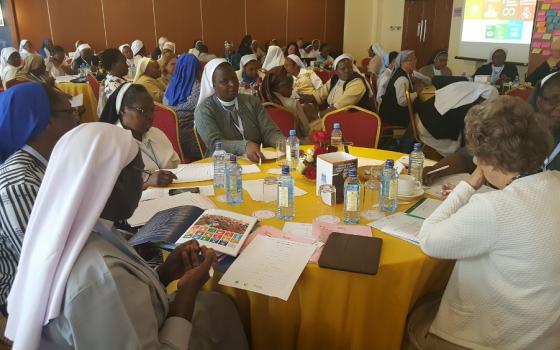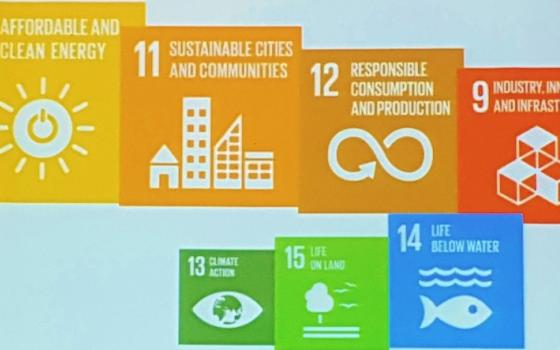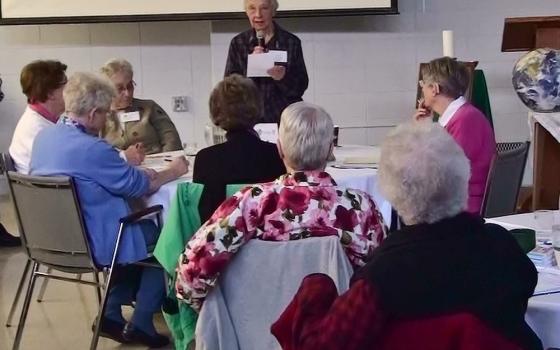One of my favorite songs is the Sustainable Development Goals' You-tube: "We love the SDGs". It makes me want to get up and dance because I am passionate about the U.N. Sustainable Development Goals, or SDGs for short.
So it was very exciting for me to attend an international meeting in Nairobi, Kenya, at the end of October: Catholic Sisters, Champions of Sustainable Development. Sisters from east, central and west Africa gathered — 140 women — to learn about the SDGs and their potential roles in helping to implement them. The day after I returned from Kenya, I participated in another meeting on the SDGs with my own congregation in South Dakota. Most people would not think of connecting Nairobi and Aberdeen, South Dakota, but it was fascinating that the two meetings focused on similar SDG concerns: environment, education, and rights of indigenous peoples, each part of the 17 goals adopted by 193 countries last year to eliminate poverty, hunger and to promote good health, gender equality, clean energy and more by 2030.
It is not always easy to consider similarities between Global North and Global South issues, but in these two meetings, similarities converged. The most current issue in our minds at the South Dakota meeting was the conflict of our neighbors in North Dakota over a multi-national oil pipeline being planted under the Missouri River, the main source of water on the Standing Rock Reservation, without adequate consultation with the Indian people. The pipeline will also disturb cultural burial grounds sacred to the community. For the Indian community, this intrusion is not only a human rights issue, but involves environmental and land grabbing issues as well. From many countries of Africa we frequently hear similar stories about multi-national land grabbing that disregards indigenous farmers' rights and destroys natural environments, most recently in Cameroon and Ghana.
Experiencing the Nairobi group's surprise and joy in learning about the SDGs and recognizing how their congregations are already addressing many of the 17 issues was thrilling. The sisters' amazement was an example of how often we do not recognize that local actions can have significant global implications and impact. There was much discussion about how nurturing a global consciousness requires constant attentiveness and perseverance, not only regarding the SDGs but even about ourselves as women religious. We are sisters from nearly every nation of the world who share a common life as women vowed to live out the Gospel in the service of others. We are one global community of commitment.
This commitment makes it imperative that we sometimes set aside individual congregational concerns enough to partner with others for the good of the whole national and global community. Yes, we can find other congregations with whom we might partner, but we also need to seek out non-governmental organizations or groups working on issues similar to the SDGs to make regional impact stronger. Collaboration and building coalitions brings together many voices, a powerful strategy for impact. Single voices are rarely given enough time, space or consideration, and ideas are thus ignored or lost. Single voices can also become weary and stop speaking. It is sometimes good to remember the image of migrating geese, who as they travel together in a "V" formation, relieve the one in front by taking the lead in turns. The support gained from others is worth the hard work as is letting go of control of leadership for the common good.
No one who has entered into collaboration denies the challenges of negotiating new relationships. Foremost, it takes conviction in shared values and then great commitment of time to intentionally to seek and deeply listen for areas where there is already synchronicity to find a common focus or intention and then set up structures for communication, sharing and leadership. But undergirding it all is the determination to keep it going. Collaborative relationships do not happen overnight. They take time to develop, so even a year or two is not unusual, particularly if there is great diversity of goals, organizational structures and personalities. These were some of the issues we addressed at the meeting, and the sisters were given opportunities to learn some techniques to help them in doing the necessary work.
A panel of representatives from government ministries, United Nations desks, civil societies, church hierarchy leaders, and philanthropy each gave examples of positive relationships and experiences they had working with sisters and pledged future collaborative efforts. All the panelists noted the great potential sisters have as a group to influence public action and policy along with the services they provide.
One sister I spoke with later said she was pleased to hear what the panelists shared but that at the same time she found it hard not to feel cynical recalling a number of prior negative experiences with some such organizations. I thought a lot about this later, remembering my own times of disenchantment with attempts at collaboration. It is a learning experience that takes a lot of patience, reflection and letting go of assumptions to find the right opportunities and dynamics to help develop these relationships.
Another lesson for the sisters in the Nairobi gathering and some of my own community in South Dakota was the value of intentionally connecting our local work with the goals of our regions and countries, in our thinking, in our discussions and in our actions. Intentionality helps nurture a consciousness of being one global community and keeps us mindful of our responsibility as citizens to recognize that our work is truly in the service of our own national development. Yes, we are serving individuals, but this service has national and global impact as well. We are all one. We need to keep remembering to help one another become the conscience of our government officials who will be responsible to report in 2030 on how the Sustainable Development Goals have been implemented in our particular countries.
Sisters left both meetings buoyed up with new energy and excitement about the potential they have in being the "Champions of Sustainable Development". I came away from both more convinced of the importance of finding ways to keep connecting and supporting our Global North and Global South activities.
Hearing about one another's creative efforts and struggles can spur us on to new creativity. Singing and dancing, "We love the SDGs," will help too. Close to 200 sisters have now signed on to the Global Sisters Report Africa Connect WhatsApp group. WhatsApp is a free mobile application that functions like a private message board. This can be a great way for us to communicate our successes, efforts, questions and dreams to support these next 15 years of work to make the Sustainable Development Goals a reality.
Editor's note to sisters working in Africa: To request to be added to the GSR WhatsApp group, please email us at [email protected] and include your mobile phone number and a brief description of your location, community and work.
[Joyce Meyer is a member of the Sisters of the Presentation of the Blessed Virgin Mary and is GSR's liaison to women religious outside of the United States.]



